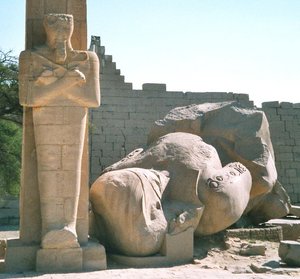5 The judgments of God are far above out of his sight. Out of his sight, as an eagle at her highest towering so lessens herself to view, that he sees not the talons, nor fears the grip. Thus man presumes till he hath sinned, and then despairs as fast afterwards. At first, "Tush, doth God see it?" At last, "Alas! will God forgive it?" But if a man will not know his sins, his sins will know him; the eyes which presumption shuts, commonly despair opens.
9 He doth catch the poor. The poor man is the beast they hunt, who must rise early, rest late, eat the bread of sorrow, sit with many a hungry meal, perhaps his children crying for food, while all the fruit of his pains is served into Nimrod's table. Complain of this while you will, yet, as the orator said of Verres, pecuniosus nescit damnari. Indeed, a money-man may not be damnified, but he may be damned. For this is a crying sin, and the wakened ears of the Lord will hear it, neither shall his provoked hands forbear it. Si tacuerint pauperes loquentur lapides. If the poor should hold their peace, the very stones would speak. The fines, rackings, enclosures, oppressions, vexations, will cry to God for vengeance. "The stone will cry out of the wall, and the beam out of the timber shall answer it." Habakkuk 2:11. You see the beasts they hunt. Not foxes, not wolves, nor boars, bulls, nor tigers. It is a certain observation, no beast hunts its own kind to devour it. Now, if these should prosecute wolves, foxes, &c., they should then hunt their own kind; for they are these themselves, or rather worse than these, because here homo homini lupus. But though they are men they hunt, and by nature of the same kind, they are not so by quality, for they are lambs they persecute. In them there is blood, and flesh, and fleece to be had; and therefore on these do they gorge themselves. In them there is weak armour of defence against their cruelties; therefore over these they may domineer. I will speak it boldly: there is not a mighty Nimrod in this land that dares hunt his equal; but over his inferior lamb he insults like a young Nero. Let him be graced by high ones, and he must not be saluted under twelve score off. In the country he proves a termagant; his very scowl is a prodigy, and breeds an earthquake. He would be a Caesar, and tax all. It is well if he prove not a cannibal! Only Macro salutes Sejanus so long as he is in Tiberius's favour; cast him from that pinnacle, and the dog is ready to devour him.
He draweth him into his net. "They hunt with a net." Micah 7:2. They have their politic gins to catch men; gaudy wares and dark shops (and would you have them love the light that live by darkness, as many shopkeepers?) draw and tole customers in, where the crafty leeches can soon feel their pulses: if they must buy they shall pay for their necessity. And though they plead, We compel none to buy our ware, caveat emptor; yet with fine voluble phrases, damnable protestations, they will cast a mist of error before an eye of simple truth, and with cunning devices hunt them in. So some among us have feathered their nests, not by open violence, but politic circumvention. They have sought the golden fleece, not by Jason's merit, but by Medea's subtlety, by Medea's sorcery. If I should intend to discover these hunter's plots, and to deal punctually with them, I should afford you more matter than you would afford me time. But I limit myself and answer all their plans with Augustine. Their tricks may hold in jure fori, but not in jure poli - in the common-pleas of earth, not before the king's bench in heaven.
10 If you take a wolf in a lambskin, hang him up; for he is the worst of the generation.
13 He hath said in his heart, Thou wilt not require it. As when the desperate pirate, ransacking and rifling a bottom was told by the master, that though no law could touch him for the present, he should answer it at the day of judgment, replied, "If I may stay so long ere I come to it, I will take thee and thy vessel too." A conceit wherewith too many land-thieves and oppressors flatter themselves in their hearts, though they dare not utter it with their lips.
As quoted in Spurgeon's Treasury of David.
 12 Blessed - whom he hath chosen. A man may have his name set down in the chronicles, yet lost; wrought in durable marble, yet perish; set upon a monument equal to a Colossus, yet be ignominious; inscribed on the hospital gates, yet go to hell; written in the front of his own house, yet another come to possess it; all these are but writings in the dust, or upon the waters, where the characters perish so soon as they are made; they no more prove a man happy than the fool could prove Pontius Pilate because his name was written in the Creed. But the true comfort is this, when a man by assurance can conclude with his own soul that his name is written in those eternal leaves of heaven, in the book of God's election, which shall never be wrapped up in the cloudy sheets of darkness but remain legible to all eternity.
12 Blessed - whom he hath chosen. A man may have his name set down in the chronicles, yet lost; wrought in durable marble, yet perish; set upon a monument equal to a Colossus, yet be ignominious; inscribed on the hospital gates, yet go to hell; written in the front of his own house, yet another come to possess it; all these are but writings in the dust, or upon the waters, where the characters perish so soon as they are made; they no more prove a man happy than the fool could prove Pontius Pilate because his name was written in the Creed. But the true comfort is this, when a man by assurance can conclude with his own soul that his name is written in those eternal leaves of heaven, in the book of God's election, which shall never be wrapped up in the cloudy sheets of darkness but remain legible to all eternity.











